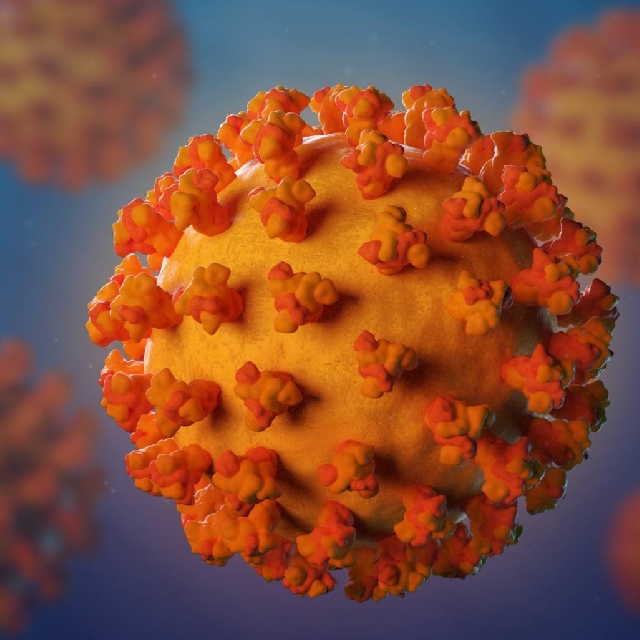COVID-19: Fast-spreading Indian variant detected in Ghana
 Since mid-March 2020, close to 800 people have died of the virus in Ghana
Since mid-March 2020, close to 800 people have died of the virus in Ghana
The most contagious Indian variant (Delta variant) of the COVID-19 pandemic has been detected in Ghana.
The Head of the West Africa Center for Cell Biology and Infectious Pathogens, WACCBIP, of the University of Ghana, Professor Gordon Awendare recently confirmed it.
“Overall, we have about 45 or 46 different variants”, he said, adding: “The trend shows that all these normally come from travellers”.
“Now that the Delta is taking over, it’s just a matter of time before it will come here in large quantities”, Professor Awendare warned.
“We have a few here but it’s going to increase,” Professor Awendare told Joy Prime.
Indian variant
According to an article on newscientist.com authored by Michael Le Page, the “Indian variant” of SARS CoV-2, more accurately called B.1.617, is a coronavirus variant that has played a big part in the second wave of infections in India and has spread to many other countries.
There is growing evidence that it spreads faster than the B.1.1.7 variant from the UK, or Kent variant, but this had yet to be definitively established at the time of writing.
There are three notable sub-variants of B.1.617. The one of most concern is called B.1.617.2, which was first detected in India in December 2020. It remained rare until early March, when it became the dominant variant reported. It has spread to many other countries, and is increasing rapidly in some. In the UK, it has become more common than B.1.1.7, though overall case numbers remain low.
There is no evidence that B.1.617.2 is any deadlier or has different symptoms to B.1.1.7. There is some evidence that vaccines may be less effective against it, but this remains unclear.
Another subvariant called B.1.617.1 was also first detected in India in December 2020. By late March half of all reported sequences there were B.1.617.1, but the proportion fell in April. It has been detected in many other countries, but only accounts for a very small proportion of cases.
B.1.617.1 has been called the “Indian double mutant”, but this term is misleading as it has around 15 mutations compared with older variants. “Double mutant” refers to the fact that it has two mutations of particular concern in the outer spike protein of the virus. These two mutations, known as L452R and E484Q, might make antibodies to older variants or existing vaccines less effective, but this has yet to be confirmed. (B.1.617.2 lacks the E484Q mutation and has other mutations not present in B.1.617.1).
The E484Q and L452R mutations are not unique to B.1.617.1. Other variants with both mutations have previously been found elsewhere in the world.
Initial studies suggest that antibodies from people infected by older strains or given the Covaxin or Oxford/AstraZeneca vaccine (known as Covishield in India) do still prevent infections by B.1.617.
B.1.617.2 has become the most common variant reported in India. However, the situation varies from state to state. Other variants including B.1.1.7, the P.1 variant first detected in Brazil, and the B.1.351 variant that evolved in South Africa, have also played a part in the second wave in India.
Some B.1.617.1 viruses have an additional mutation called V382L in the spike protein. This is what is meant by the term “triple mutant”. This mutation has also been found elsewhere, and there is no evidence that these “triple mutant” viruses spread more readily or are deadlier.
In general, almost all coronavirus variants can be detected only by sequencing the genome of the virus. To find out if new variants are more transmissible or deadlier, it is necessary to identify large numbers of variants, to see if there are significant differences in the way they spread or affect people. Most countries, including India, do little if any sequencing, which is why there is so much uncertainty about whether particular variants really are more dangerous.
Source: Classfmonline.com
Trending News

Former Akufo-Addo–appointed MMDCEs demand payment of ESB
13:12
IGP Special Operations Team arrests suspected drug peddlers in Tamale crackdown
12:57
E/R: Bee attack injures several residents in Abotanso community
13:03
Adwoa Safo defends Bawumia, urges NPP delegates to reject blame over economy
11:50
Ex-footballer says he was wrongfully jailed after ‘hook-up’ encounter; claims police freed key suspect after allegedly taking bribe
12:38
Gov't to introduce awards scheme for cleanest regions, districts: President Mahama announces
13:47
Ghana chamber of mines urges government to pause mining royalty reforms
12:50
Ghana Library Authority begins review of 55-year-old law establishing it
12:42
HIV cases rise in Volta Region amid poor condom use among youth
13:15
NDC Legal Director expresses concern over confusion surrounding Daddy Lumba’s funeral
12:20




